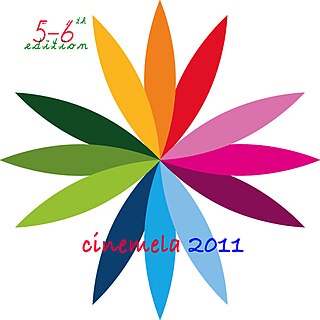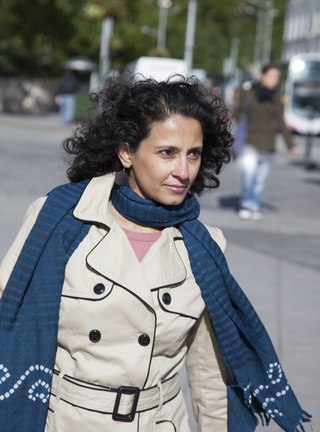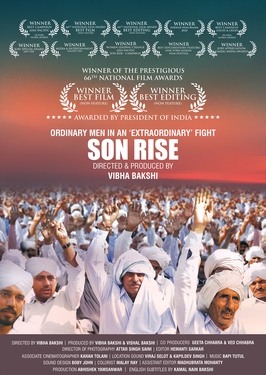
Centre for Civil Society (CCS) is a non-profit think tank based in New Delhi. It was founded in 1997 by Dr Parth J Shah, former Professor of Economics at the University of Michigan. It operates as an independent educational organisation.
Sagari Chhabra is an Indian writer and film director. She has written and directed fifteen documentary films and one fiction film, winning five national and international awards.
Final Solution is a 2004 documentary film directed by Rakesh Sharma concerning the 2002 Gujarat riots in the state of Gujarat in which 254 Hindus and 790 Muslims were killed. Hindu right wing organizations were made responsible for these riots which took place as a "spontaneous response" to the demise of 70 Hindu Pilgrims in the Godhra Train Burning by a mob on 27 February 2002. But as the film proceeds with victims continuing to come forward and share their experiences, a more unsettling possibility seems to emerge- that far from being a spontaneous expression of outrage. The makers of the film claim that the violence had been carefully coordinated and planned.

Stories of Change is a 2008 documentary film by BRAC Pathways of Women Empowerment.
The Development Film Festival in India is a platform for film makers to showcase their works on themes concerning the development of the poor and vulnerable communities. The Centre for Development Communication of DHAN Foundation organises the festival. The festival is organised every year on a theme in development.

Ranjan Ghosh is a Bengali filmmaker based out of Kolkata, India. He had risen to prominence with the release of Aparna Sen's Bengali feature film Iti Mrinalini, by becoming the first and the only screenwriter, the acclaimed actor-director had collaborated with in her illustrious career till date. With this film, Ghosh had made his screenwriting debut. He made his directorial debut in 2014 with the critically acclaimed Hrid Majharey, a Bengali feature film starring Abir Chatterjee and Raima Sen. Inspired by certain iconic plays of William Shakespeare, it was the first film in the Bengali language based on the works of the Bard and was presented as a tribute on his 450th Birth Anniversary. His second film Rongberonger Korhi was an anthology of four short films woven around the theme of money and its relationship with human beings. It featured National Award-winning actor Rituparna Sengupta, veteran cine star Chiranjeet Chakraborty, critically acclaimed actors Ritwick Chakraborty, Soham Chakraborty, Kharaj Mukherjee, Arunima Ghosh, Arjun Chakrabarty and others. It became a widely acclaimed film on release in 2018, before doing the festival rounds in Dubai, Dhaka, London, and nationally at Delhi, Mumbai, Bengaluru, Pune and Hyderabad. In 2019, Ghosh released his third feature film, the hugely successful Ahaa Re featuring Bangladeshi actor Arifin Shuvoo, Rituparna Sengupta, Amrita Chattopadhyay, Paran Bandopadhyay, Deepankar De, Shakuntala Barua, Bangladeshi Cinema film actor Alamgir in a special appearance as a restaurant owner. The film made it to a coveted list of 25 all-time great Asian films about food, compiled by international film web magazine Asian Movie Pulse. Ghosh's fourth feature film Mahishasur Marddini - A Night to Remember featuring his muse Rituparna Sengupta along with Saswata Chatterjee, Parambrata Chattopadhyay and a bunch of young theatre actors, released in 2022 and is touted as his boldest work till date in which he experiments with form and style, combining the elements of theatre and cinema. The film was screened at the Film and Television Institute of India, Jawaharlal Nehru University, Jamia Millia Islamia, University of Hyderabad, English and Foreign Languages University, University of Kerala, SNDT Women's University, Pondicherry University, IIT Bombay, Indian Institute of Science Education and Research, Kolkata and Tata Institute of Social Sciences. The Indian People's Theatre Association, Kollam District Committee, Kerala, screened the film in August 2023. Earlier, it became the first Indian feature film to screen at any theatre festival anywhere in India when it played at the 21st Habitat Theatre Festival, 2022, organized by the India Habitat Centre, New Delhi.
Shohini Ghosh is the Sajjad Zaheer Professor of media at the AJK Mass Communication Research Center, Jamia Millia Islamia. She is an essayist on popular culture and a documentary filmmaker. In a 2007 interview at the University of Minnesota, she provided reflections on her life and work.

Cinemela is an annual film festival organized in New Delhi, India since 2006. This festival provides the best stage to young filmmakers from all over the globe to showcase their works. The festival has been recognized by the Limca Book of World Records for its uniqueness.

Kaz Rahman is a Canadian visual artist and filmmaker. His work explores and coalesces the intersection between Islamic artistic expression, the natural elements and contemporary culture.
The Seattle Asian American Film Festival was founded in 1985 and has been revived over the years by different producers. The current iteration was founded in 2012 and made its debut in 2013 by co-founders Kevin Bang and Vanessa Au. It is a revival of of the previously running Northwest Asian American Film Festival, which was directed by Wes Kim from 2003 to 2007 and which had experienced a five-year hiatus. The inaugural film festival was also held at the Wing Luke Asian Museum from January 25 to 27, 2013. The festival is currently run and directed by Executive Director, Vanessa Au, and Festival Director, Victoria Ju.

Vijay Bedi is the third generation of wildlife film maker and photographer in a family that has a long history of expertise in this highly specialized field.

The Mumbai International Film Festival for Documentary, Short and Animation Films (MIFF) is a festival organized in the city of Mumbai by the Films Division, Ministry of Information and Broadcasting, Government of India. It was started in 1990, and focuses on documentary, short fiction and animation films.
Jeevika: Asia Livelihood Documentary Festival is a film festival started in January 2004 by the Centre for Civil Society, in New Delhi, India. The festival is a part of their
Caste on the Menu Card is a 21-minute documentary film made by students of the School of Media and Cultural Studies at the Tata Institute of Social Sciences (TISS), focuses on beef-eating practices in Mumbai, India. It portrays the prevalence of caste differentiation in food choices of people in Mumbai, how it causes exclusion, and touches upon concerns related to livelihood, social inclusion and human rights.

The Cinema of Manipur is the film industry based in Manipur, India. It includes not only Meitei language movies but all the films made in different languages of the different communities in Manipur. The Manipuri film industry was born when Matamgi Manipur by Debkumar Bose was released on 9 April 1972. From Aribam Syam Sharma's Paokhum Ama, the first colour Manipuri film (1983), M.A Singh's Langlen Thadoi, the first full-length colour Manipuri film (1984), Oken Amakcham's Lammei, the first Manipuri digital film (2002), to Priyakanta Laishram's Oneness (film), the first Manipuri gay-themed film (2023), Manipuri cinema, which celebrated its 50th anniversary in 2022, has grown in both its form and culture.

Vibha Bakshi is an Indian filmmaker, journalist, and founder of Responsible Films. She is known for her films that highlight issues of gender inequality. Vibha's most notable films as both director and producer include Daughters of Mother India and Son Rise. Both films are winners of the National Film Awards from the President of India. She is the recipient of four National Film Awards from the President of India.

Akanksha Damini Joshi is an Indian filmmaker, cinematographer, photographer and a meditation facilitator.

Son Rise is a 2019 Indian Hindi-language documentary film directed and produced by Vibha Bakshi. The film is set in Haryana, infamous for its strongly embedded patriarchy. Yet, from this unlikeliest place, Vibha Bakshi's Son Rise follows those men who are trying to break the shackles of patriarchy and fight for women's rights.
The Forest City Film Festival is a film festival located in London, Ontario, Canada. Founded in 2016, the Forest City Film Festival centres on exhibiting the work of filmmakers from Southwestern Ontario in juried competition for features, shorts, documentaries, short animations and other categories, although it also screens a selection of other Canadian and International films out of competition.










